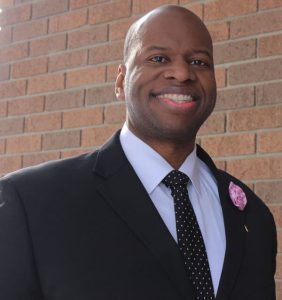For De’Andre L. Shepard, Ph.D., assistant professor of educational leadership at the University of Michigan-Flint, building strong relationships with students goes beyond an educator’s desire to teach students to accomplish what is expected of them in class.
Relationship-building from an educator’s perspective requires the simple act of starting conversations and showing students that their school leaders genuinely care about their activities, interests, and goals, not just their grades.
“Building relationships is extremely important for people of all backgrounds,” Shepard said. “Just start a conversation and be open to change.”
Shepard joined UM-Flint in September 2015, teaching graduate-level educational leadership courses as an assistant professor in the Education Department within the School of Education and Human Services. Prior to joining the Education Department, he earned his doctoral degree in educational leadership from Oakland University, his school leadership certification from Harvard Graduate School of Education, and an education specialist degree in school administration from Oakland University.
Relationship-building is the common thread of Shepard’s research interests in leadership identity development, organizational culture, teacher training in special education, and the utilization of extracurricular activities to promote student engagement and academic success.
What classes do you typically teach at UM-Flint?
I teach primarily in the Education Specialist Program: EDL 700-Contemporary Leadership Issues in Education; EDL 703-Survey of Advanced Leadership; EDL 750-Topics in School Law; EDL 761 & EDL 762 Practicum Iⅈ EDL 790 Capstone Seminar; EDL 990- Dissertation I Research and Prospectus; and EDL 995-Dissertation II.
How has your involvement in athletics influenced your career in education?
There is a lot of research surrounding athletics and extracurricular activities that show how involvement in these helps build character, time management and social skills, and leadership skills. These skills are all transferable to other areas of life. In class, I use examples from my experience as an athlete and athletic coordinator to talk about building relationships with students and how that impacts student achievement.
Do you recall a special teaching moment that made an impact on you as an educator?
When I was working as a high school athletic director in the Detroit area, I met a student who had a history of repeated behavior problems. Finally, one day his behavior boiled over so badly that he was suspended and not allowed in the school for his entire senior year. His home life was so rough, that working from home was making it impossible for him to graduate. I understand that I put my job on the line, but I helped him get into school for the last six months of the year so he could complete his work, and I helped him graduate and get into college.
Today, this young man is a senior, he has earned a football scholarship, he holds the school record in receiving yards, he is a nursing major, and three NFL teams watched him work-out this past season. He has a full class load and a job. We are in constant communication, and he spends holidays with my family (his family now). By reaching out to him, I learned that every child deserves a chance to get an education, and when you invest in students, you never know the limits they can reach. He will always be my inspiration for being an educator.
What do you want your graduate students to know about how they can succeed as education leaders and continue to make a difference for their students?
My students are different because they are seasoned teacher leaders or current administrators. What can happen as an administrator is that you become so busy with leading a school, you sometimes lack the time to try innovative ideas.
My approach is to make the classes very reflective. I push students to find out what they’re passionate about and to determine how that passion can help influence student achievement—not just with A’s and B’s but socially and to build relationships. I want the class to almost feel like an incubator and allow them to experiment or work on projects that for one reason or another ended up on the back burner. I want them to come away from the course with a platform that they’re an expert on and they’re excited about.
What kind of leaders do you want your graduate students to become?
I try to develop teachers who lead with laughter, love, and passion. Love what you are doing, love students, and be passionate about it!

